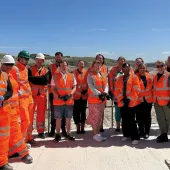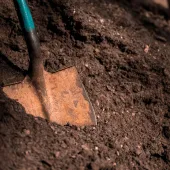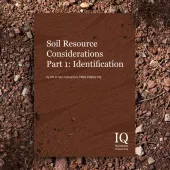IQ launch new membership grade

First published in the April 2014 issue of Quarry Management as The Launch of TMIQ
‘Recognizing individuals and what they do’ – the new membership grade from the Institute of Quarrying
The official launch of the Institute of Quarrying’s new membership grade took place on 13 February 2014 at the East Midlands Conference Centre.
The morning commenced with Colin Jenkins, President of the Institute of Quarrying (IQ), welcoming those in attendance and underlining the changes which had taken place in the Institute’s almost 100 years of existence. The new TMIQ members present were also welcomed and Mr Jenkins said the launch of the new grade marked an important milestone for the Institute, reflecting the changing world in which we live.
Phil James, chief executive officer of both IQ and the Mineral Products Qualifications Council (MPQC), explained that the new grade was also being introduced by IQ’s overseas sections around the world and would provide professional recognition for a new group of people within the industry.
Attention was also drawn to the Level 3 First Line Supervisor’s Qualification in Health, Safety and the Environment, an accredited qualification on offer from the IQ in partnership with the British Aggregates Association.
The membership group’s demographic was detailed by IQ general manager Mike Phillips, covering the qualification requirements and eligibility for the new grade. He explained that the core reasons behind its implementation were to upskill and provide appropriate recognition for the individuals concerned.
He also noted that rigorous standards for the acceptance of TMIQ membership were in place, with the minimum requirements for an individual to be eligible for the grade being a recognized qualification and minimum of one year’s experience in the sector.
Miles Dobson, head of manufacturing - aggregates and asphalt with Lafarge Tarmac, underlined the importance of the new membership grade and how it fitted in with the businesses ethos of Lafarge Tarmac, encouraging people both to develop themselves and to further their careers, which also assisted in employee retention.
Mr Dobson explained that a complete educational pathway was currently being developed both for existing Lafarge Tarmac employees and for those being recruited as apprentices at undergraduate level. The company’s full support for the new grade was emphasized as it was seen as a way of providing recognition for individuals who had worked hard to develop themselves.
Andrew Caile TMIQ, maintenance team leader; David Swindell TMIQ, maintenance co-ordinator; and Antony Salt TMIQ, explosives supervisor, were the first of the new members to be presented and congratulated by Colin Jenkins for their achievement in attaining TMIQ membership.
Roy Bush from the Health and Safety Executive noted the importance of workforce engagement, training and competence in striving to achieve zero harm, with the new membership grade going some way in helping to achieve this. In addition, he stressed the importance of employing competent contractors who also needed to be engaged with the safety process in the same way as the rest of the workforce in pursuance of zero harm and meeting the requirements of Regulation 40.
Jonathan Hurley, manager - processes and systems with Volvo Construction Equipment, explained that the company featured in The Sunday Times list of ‘the best companies to work for’, ranking at 46 in 2012 and 36 in 2013. He noted that a highly engaged workforce offered a number of benefits to the business including enhanced profitability, productivity and customer satisfaction, as well as reduced levels of defects, accidents, staff turnover and absenteeism. In conclusion, he said that the recognition of employees in the TMIQ grade was seen as an important way of both encouraging engagement and recognizing an individual’s professional development.
Andy Blow TMIQ, product specialist, was next to be presented with his certificate of membership. Having worked in the industry for 28 years, 24 of which have been spent with Volvo CE, he thanked those attending for the recognition the new TMIQ grade of membership had provided him with.
Rob Doody, operations director - aggregates and asphalt with CEMEX UK, said how proud he was to be a part of the launch, which will go some way towards professionalizing the industry and providing recognition to individuals and employees involved within it. The creation of TMIQ was seen as something of key importance to CEMEX, providing increased motivation, productivity and profit, together with further benefits in the reduction of costs and accidents.
Mark Mitchelmore TMIQ, southern area technical manager with CEMEX, gave an insight into the lack of development routes open to individuals in the industry he joined 29 years ago – a stark contrast to the minerals sector today, which provides numerous opportunities allowing both personal development and recognition for individuals.
Cedric Hollinsworth, chairman of the MPQC, went on to underline how the PRIME (Professional Recognition in Mineral Extraction) project was about promoting the introduction of CPD to all levels within the industry, formally recognizing the contribution made as professionals by senior operatives, foreman and supervisors, and encouraging more active workforce engagement.
The creation of the PRIME project came about because of the demographic ‘time bomb’ present within the industry, which has an aging workforce with an average age of 55. Also, with the difficulty of recruiting in the sector, the project was seen as a means of opening up the doors to the industry and promoting the opportunities and progression routes open to individuals.
A further area of the PRIME project that is currently under way is an engagement programme taking place within schools. Starting off as a three-year project, it is hoped that it will develop and extend beyond this.
During the launch event it was confirmed that the main roll-out of PRIME will take place at Hillhead 2014, where the focus will be on engagement with individuals and the large-scale promotion of the project.
Ian Knott, head of operations for Explosives and Blasting Services at EPC-UK, provided an insight into the highly regulated area of the industry in which his company works and the need for clearly defined development pathways leading to the designation of shotfirer or explosives supervisor.
He said the TMIQ grade was seen as key in providing additional recognition for the skills and expertise of the company’s employees and the subsequent dividend of workforce motivation and its effect on safety, profitability and absenteeism.
With 24 years’ service in the industry, John Morgan TMIQ, shotfirer and explosives supervisor, was very proud to accept the recognition of TMIQ grade, which he said would give people the chance to demonstrate their progression and professionalism to a higher level.
The launch was drawn to a conclusion by Colin Jenkins who said it was very warming to hear what the recognition meant to both individuals and their employers, and how TMIQ membership was seen as underlining and broadening of the appeal of the Institute. Also, it had drawn attention to the fact that competence was not just about zero harm, but about having a better-run business and the benefits this brings with it, including higher levels of worker engagement in addition to the financial and moral benefits to the business.
For further information about the Institute of Quarrying, membership or the TMIQ grade, visit: www.quarrying.org; email: mail@quarrying.org; or phone: +44 (0)115 972 9995. More information can also be found on Twitter: @IQ_UK
- Subscribe to Quarry Management, the monthly journal for the mineral products industry, to read articles before they appear on Agg-Net








